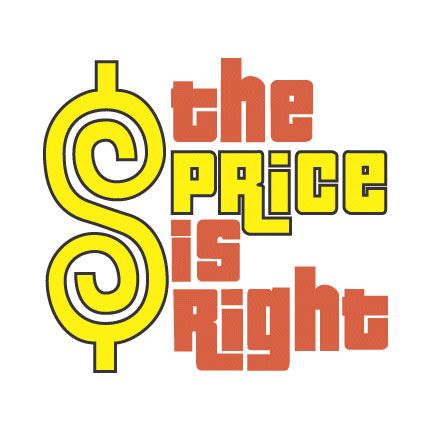Two things I wonder about regarding "The Price is Right":
(1) Misbidding
On Contestant's Row, where four contestants bid for an initial prize and the right to play a game and spin the showcase wheel, it's amazing how often the last person makes inefficient bids.
No matter what the prize you are bidding for, imagine that the first three bids in front of you are $450, $575, and $600.
If you think the item is really worth at least $800, you shouldn't bid $800, but rather $601. Otherwise, you are conceding the range between $600 and $800 to the third player, when there's no reason to do so.
Similarly, if you think everyone is over (remember, in "The Price Is Right," the winning bidder is the one closest to the actual price without going over) but you think the item is worth at least $200, you should bid $1, not $200. This way, you win if the item is priced from $1 as high as $599, but you would all be over, and bidding would start over for new prize, if the item ended up being cheaper than $200.
Yet contestants make both types of bidding errors on a regular basis.
(2) Memorizing Car Prices?
I wonder if it would be worth your while to memorize the prices of all new cars if you're going to be in the audience.
First, we'd have to estimate the chances of you playing a game involving a car, given that you are a member of the audience (using the same conditional probabilities methodology that
Book of Odds does, when it calculates things like the odds of
a given cow being used to make a football for the Super Bowl).
I don't know the audience size, but only six contestants per show play a game, and only a fraction of those play a game involving a car. So getting to the point where car knowledge would benefit you is remote.
If I had the inclination, I could visit a site like the
Price Is Right Blog and see what makes of cars have been involved in games. Then I could research the models and their prices for each of these makes (which might be easier than you think, as each make
only has about a dozen new models).
People vary dramatically when it comes to memorization skill. If you can easily memorize 100 or so five-digit numbers (and I certainly can't) and you get in a game involving a car, you're pretty much guaranteed to win. With no such knowledge, let's say your chances of winning are 50%. So, if you're playing a game for a $20,000 car, you've increased your expected winnings by $10,000.
However, because the chances of going from an audience member to a contestant involved in a car game are so small, perhaps such memorization will only increase your expected winnings by a few pennies and therefore won't be worth the effort.






.jpg)
